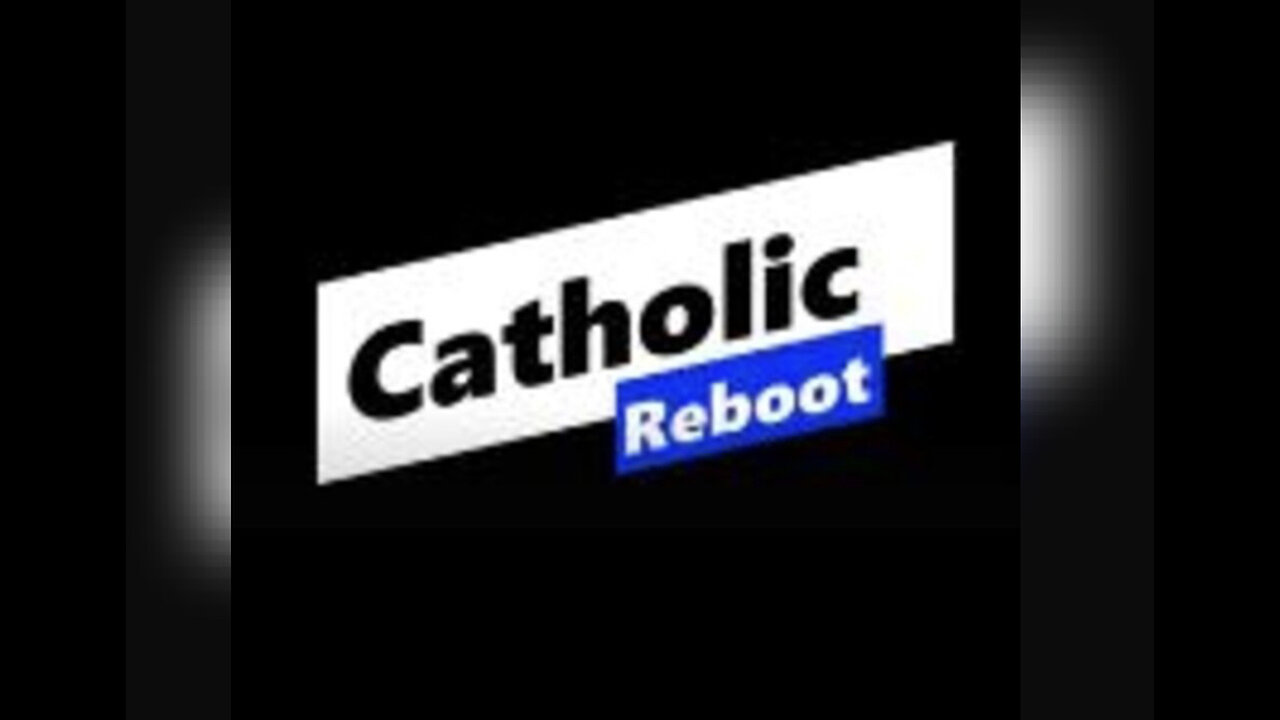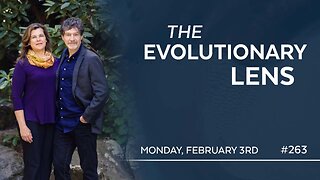Premium Only Content

Episode 1589: The Second Sword of Sorrow - Mary escapes into Egypt with Jesus and Joseph
And after they were departed, behold an angel of the Lord appeared in sleep to Joseph, saying: Arise, and take the child and his mother, and fly into Egypt: and be there until I shall tell thee. For it will come to pass that Herod will seek the child to destroy him.
Who arose, and took the child and his mother by night, and retired into Egypt: and he was there until the death of Herod:
That it might be fulfilled which the Lord spoke by the prophet, saying: Out of Egypt have I called my son."
(Matthew 2:13-15) emphasizes several key points:
Divine Guidance and Protection: Catholics believe that this passage demonstrates God's divine intervention and guidance. The angel's appearance to Joseph in a dream is seen as a direct communication from God, providing specific instructions to protect Jesus from King Herod's plot.
Obedience to God's Will: Joseph's immediate and unquestioning response to the angel's message reflects his deep faith and obedience to God's will. He promptly takes Mary and Jesus and flees to Egypt, demonstrating his role as the earthly guardian of the Holy Family.
Submission and Trust: Obedience to God's will involves a deep sense of submission and trust in God's wisdom, providence, and love. It means recognizing that God's plan is ultimately for our good, even if we may not fully understand it at the time.
Mary and Joseph as Models: Mary and Joseph are often held up as prime examples of obedience. Mary's fiat (her "yes" to becoming the Mother of God) and Joseph's prompt response to the angel's message both exemplify unwavering obedience to God's divine plan.
Discernment: Obedience does not imply blind acquiescence. Rather, it involves prayerful discernment and openness to God's guidance. This can come through various means, including Scripture, prayer, spiritual direction, and the wisdom of the Church.
Alignment with God's Word: Obedience is always in harmony with God's revealed Word as found in the Scriptures and Tradition. It never contradicts the moral and doctrinal teachings of the Church.
Sacrifice and Self-Denial: Obedience sometimes requires sacrifice and self-denial, as seen in Joseph's willingness to uproot his family and flee to a foreign land. It may involve leaving behind comfort, security, or personal plans in order to follow God's lead.
Perseverance: Obedience is not a one-time event but a continual disposition of the heart. It requires ongoing trust and a willingness to follow God's lead, even in the face of challenges, uncertainties, or difficulties.
Fulfillment and Joy: True obedience brings about a deep sense of fulfillment and inner peace. It aligns us with God's purpose for our lives and leads to a profound sense of joy, even in the midst of trials.
Holiness and Virtue: Obedience is considered a key virtue in the Christian life. It fosters humility, docility, and a disposition to cooperate with God's grace, ultimately leading to greater holiness.
In the context of Matthew 2:13-15, Joseph's immediate and unquestioning response to the angel's message exemplifies this spirit of obedience. He trusts in God's guidance and takes prompt action to protect the Holy Family, even in the face of uncertainty and danger. This act of obedience is seen as a model for all Christians in their journey of faith.
Fulfillment of Prophecy: The Catholic Church sees this event as fulfilling Old Testament prophecies, particularly Hosea 11:1, which states, "Out of Egypt I have called my son." This emphasizes the continuity between the Old and New Testaments and underscores Jesus as the fulfillment of ancient prophecies.
The concept of fulfillment of prophecy is significant in traditional Catholic theology. It refers to the idea that events and circumstances in the New Testament are often prefigured or foretold in the Old Testament, and that Jesus Christ, as the Messiah, fulfills these prophetic predictions. Here are some key points regarding the fulfillment of prophecy in traditional Catholic teaching:
Unity of Scripture: Catholics believe that the Old and New Testaments are intimately connected. The New Testament is the fulfillment and culmination of the promises, prophecies, and types found in the Old Testament. This unity highlights God's consistent plan for salvation throughout history.
Types and Shadows: Many figures, events, and institutions in the Old Testament are seen as types or shadows of Christ and His work. For example, the Passover lamb in Exodus prefigures Jesus as the Lamb of God who takes away the sins of the world (John 1:29).
Prophetic Voices: The Old Testament contains numerous prophecies about the coming of the Messiah, His birth, life, death, and resurrection. These prophecies serve as pointers or indicators, preparing God's people for the fulfillment in Jesus Christ.
Hosea 11:1: The specific prophecy cited in Matthew 2:15, "Out of Egypt have I called my son," is understood by Catholics as a reference to the nation of Israel in the Old Testament (Hosea 11:1). In the New Testament, this verse is applied to Jesus, signifying His role as the true and ultimate Israel, the Son of God.
Messianic Prophecies: There are numerous Old Testament prophecies that directly pertain to the coming of the Messiah, His nature, mission, and the events of His life. For example, Isaiah 7:14 foretells the virgin birth of Jesus.
Historical Events and Figures: Certain historical events and figures in the Old Testament are interpreted as prefigurations of Christ. For instance, the story of Jonah being in the belly of the great fish for three days and three nights is seen as a type of Christ's death and resurrection (Matthew 12:40).
Ecclesial and Sacramental Fulfillment: Traditional Catholic teaching also sees the Church and the sacraments as fulfilling various Old Testament types. For example, the Eucharist is understood as the fulfillment of the Old Testament Passover.
Continual Relevance: The fulfillment of prophecy is not seen as merely a historical fact, but as a present reality in the life of the Church. This understanding provides believers with a sense of continuity and assurance in God's plan.
Overall, the traditional Catholic view emphasizes the rich tapestry of connections between the Old and New Testaments, with Jesus Christ as the central figure who fulfills all that was foretold. This fulfillment is seen as a testament to God's faithfulness and the coherence of His plan for salvation.
Symbolism of Egypt: Egypt traditionally represents a place of bondage and exile in the Bible. In this context, Jesus' sojourn in Egypt before returning to Israel is seen as symbolic of His mission to liberate humanity from the bondage of sin.
Place of Bondage and Oppression: In the Old Testament, Egypt is often associated with oppression and bondage. The Israelites were enslaved in Egypt for generations before being led to freedom by Moses. In the New Testament, Egypt serves as a symbol of the world's bondage to sin and the need for liberation through Christ.
Exile and Sojourn: The flight into Egypt is seen as a form of exile for the Holy Family. They are forced to leave their homeland and take refuge in a foreign land. This experience parallels the exile of the Israelites in the Old Testament and signifies the earthly pilgrimage and temporary nature of life in this world.
Safety and Sanctuary: Egypt provided a place of safety for the Holy Family, protecting them from King Herod's murderous intentions. In this sense, Egypt symbolizes a sanctuary where God provides refuge and protection for His people in times of danger.
Spiritual Sojourn and Conversion: The journey to Egypt and the subsequent return to Israel can also be viewed as a spiritual sojourn. It represents a period of growth, reflection, and conversion for the Holy Family. It is in this foreign land that they deepen their relationship with God and fulfill His will.
Christ's Universal Mission: The flight into Egypt illustrates that Christ's mission is not confined to a specific geographical or cultural context. By seeking refuge in a foreign land, Jesus demonstrates that His salvation is meant for all peoples and nations, emphasizing the universal nature of His message.
Preparation for Ministry: Some theologians see the time spent in Egypt as a preparatory period for Jesus before He begins His public ministry. It is a time of spiritual formation and maturation, equipping Him for the mission ahead.
Foreshadowing of Baptism: Egypt's association with water (the Nile River) can be seen as a foreshadowing of baptism. The flight into Egypt followed by the return to Israel can symbolize a form of spiritual rebirth and renewal, akin to the sacrament of baptism.
Parallel to Israel's History: Just as the nation of Israel, as a whole, had once been in Egypt and then led out of it by Moses, here Jesus, as the embodiment of the true Israel, also experiences a sojourn in Egypt before His mission of liberation.
Overall, the symbolism of Egypt in this context emphasizes themes of liberation from bondage, spiritual pilgrimage, refuge in God, and preparation for mission. It serves to underscore the universal scope of Christ's salvific work and the transformative power of God's providence.
Protection of the Holy Family: The flight into Egypt highlights the Holy Family's vulnerability and the threats they faced, even as Jesus was still an infant. This underscores the idea of Jesus identifying with and sanctifying every aspect of human life.
The concept of the protection of the Holy Family is a significant theme in traditional Catholic teaching. It refers to the providential care and guidance that God extended to Joseph, Mary, and Jesus, particularly in times of danger and adversity. Here are some key points regarding the protection of the Holy Family according to traditional Catholic belief:
Divine Intervention: Catholics believe that God intervened directly in the lives of Joseph, Mary, and Jesus, providing them with special graces and guidance. This divine protection ensured the safety and well-being of the Holy Family, especially in moments of peril.
Angel's Warning: In this specific passage (Matthew 2:13-15), an angel of the Lord appears to Joseph in a dream to warn him of King Herod's plot to harm Jesus. This angelic intervention is seen as a clear demonstration of God's protective care.
Joseph as Guardian: Joseph plays a central role as the earthly guardian of the Holy Family. His obedience to God's instructions and his vigilant care for Mary and Jesus exemplify his role as the protector and provider for his family.
Escape to Egypt: Joseph's immediate response to the angel's warning is to take Mary and Jesus and flee to Egypt. This action highlights his willingness to take decisive steps to safeguard his family, even in the face of uncertainty.
Model for Fathers: Joseph's protective role is often held up as a model for fathers in the Catholic tradition. He is seen as a loving and responsible father who is willing to go to great lengths to ensure the safety and well-being of his family.
Mary's Role: While Joseph takes the lead in physically protecting the Holy Family, Mary's profound faith and trust in God are also evident. She relies on Joseph's leadership and supports him in their journey.
Reflection of God's Care for Humanity: The protection of the Holy Family is seen as a reflection of God's care for all of humanity. Just as God provided for and protected the Holy Family, He is believed to offer similar care and guidance to all families.
Relevance Today: The concept of the protection of the Holy Family is not limited to historical events. It is considered a timeless truth that speaks to God's ongoing providential care for families and individuals who turn to Him in faith.
Intercession of the Holy Family: Catholics often seek the intercession of the Holy Family in their own lives, asking for their guidance, protection, and blessings, especially in matters related to family life.
Overall, the protection of the Holy Family is a cherished theme in Catholic theology, underscoring the belief in God's active involvement in the lives of His people and the importance of strong, loving family relationships. It serves as an inspiration for families to turn to God in times of need and to support and protect one another.
Herod's Evil Intentions: King Herod's murderous intent towards the infant Jesus contrasts sharply with Joseph's protective care. This underscores the contrast between earthly power and God's divine plan.
King Herod's evil intentions, as depicted in the Bible, particularly in the Gospel of Matthew, are a significant element in the traditional Catholic understanding of the Nativity narrative. Here are some key points regarding Herod's evil intentions according to traditional Catholic belief:
Historical Context: King Herod, also known as Herod the Great, ruled over Judea during the time of Jesus' birth. He was a powerful and ambitious ruler who was known for his brutal and ruthless methods of maintaining power.
Fear of a Rival: When the Magi arrived in Jerusalem seeking the newborn "King of the Jews" (Matthew 2:2), Herod saw this as a potential threat to his own rule. He viewed the newborn as a rival who could challenge his authority.
Deception and Manipulation: Herod's response to the news of Jesus' birth was marked by deceit and manipulation. He feigned interest in worshipping the child, instructing the Magi to find the child and report back to him (Matthew 2:7-8).
Murderous Intent: When the Magi did not return to Herod with information about Jesus' whereabouts, he realized that they had outsmarted him. Filled with rage and fear for his throne, Herod resorted to a cruel and heinous plan: he ordered the massacre of all male infants in Bethlehem who were two years old and under (Matthew 2:16-18). This event is known as the "Massacre of the Innocents."
Fulfillment of Prophecy: The massacre of the infants in Bethlehem is understood as a fulfillment of the prophecy in Jeremiah 31:15, which speaks of the lamentation in Ramah. This prophecy is cited by Matthew to emphasize the tragic consequences of Herod's evil actions.
Comparison with Pharaoh: Herod's order to kill the infants mirrors Pharaoh's command in the Old Testament to kill the male Hebrew infants in Egypt (Exodus 1:15-22). This parallel underscores the themes of oppression, tyranny, and God's intervention to protect His chosen people.
Symbol of the World's Opposition to Christ: Herod's actions are often seen as symbolic of the world's hostility towards Jesus and His message. The massacre of the innocents highlights the spiritual battle between the forces of evil and the coming of the Savior.
Divine Intervention: God's providential care is evident in the fact that Joseph is warned in a dream about Herod's intentions, prompting the flight into Egypt (Matthew 2:13-14). This divine intervention ensures the safety of Jesus and fulfills God's plan.
Overall, Herod's evil intentions serve to contrast the worldly power and cruelty of human rulers with the divine purpose and providence of God. It underscores the profound significance of Jesus' mission as the Savior who overcomes the darkness and oppression of the world.
Overall, the traditional Catholic interpretation of this passage emphasizes themes of divine guidance, obedience, fulfillment of prophecy, and the sanctification of human life. It also highlights the Holy Family as a model for families, particularly in times of adversity.
-
 1:38:44
1:38:44
The Quartering
2 hours agoTrump's Tariffs Already Work, Blackhawk Pilot Coverup, DNC Makes Insane David Hogg Appointment
43K22 -
 LIVE
LIVE
Dr Disrespect
4 hours ago🔴LIVE - DR DISRESPECT - TARKOV - ZERO TO HERO RAIDS ONLY
4,206 watching -
 1:13:51
1:13:51
Candace Show Podcast
2 hours agoEXCLUSIVE! Did Ryan Reynolds Extort Hollywood Execs? | Candace Ep 143
45K40 -
 LIVE
LIVE
Darkhorse Podcast
3 hours agoThe 263rd Evolutionary Lens with Bret Weinstein and Heather Heying
919 watching -
 9:37
9:37
Silver Dragons
2 hours agoGoodbye Cheap Silver - How the Tariffs Will Change Stacking Forever
2.21K -
 37:33
37:33
CryptoWendyO
2 hours ago $0.47 earnedWORST DAY IN CRYPTO HISTORY $10 Billion in Liquidations!
5.65K4 -
 57:01
57:01
PMG
2 hours agoHannah Faulkner and Dr. Bryan Ardis | Don't Fall For the Bird Flu!!!
5.99K -
 1:18:00
1:18:00
Russell Brand
1 day agoUFOs, Whistleblowers, and Government Lies – The Truth with Jeremy Corbell – SF530
174K58 -
 1:57:47
1:57:47
The Charlie Kirk Show
3 hours agoThe Most Beautiful Word in English + Confirm Tulsi! | Navarro, McCain, Posobiec | 2.3.2025
169K41 -
 1:13:03
1:13:03
Michael Franzese
3 hours agoRATING Trump’s First Two Weeks In Office
43.4K20